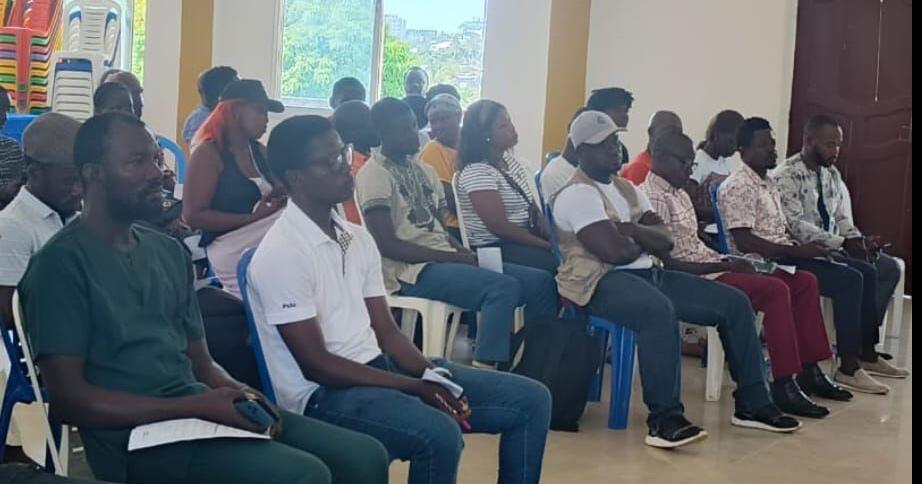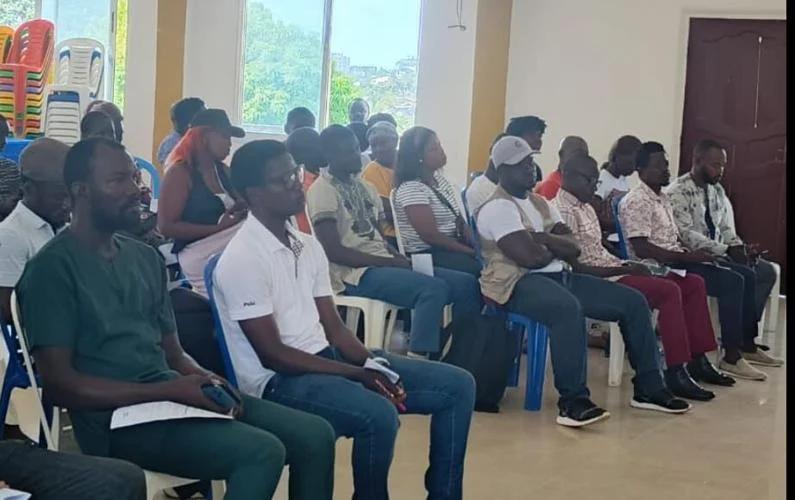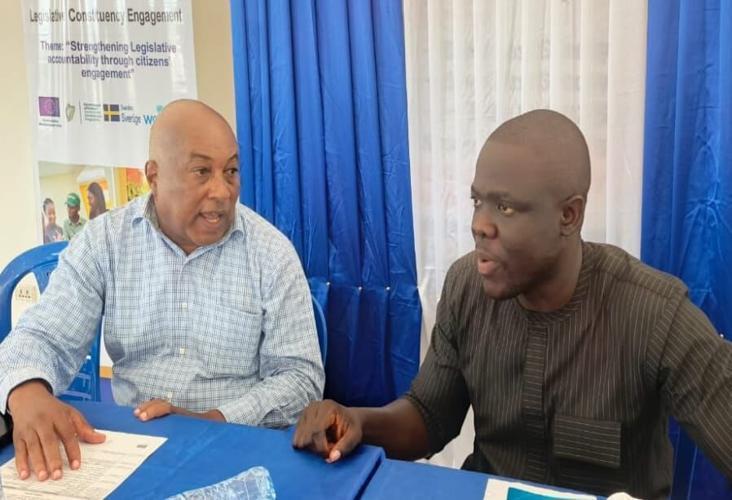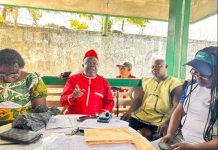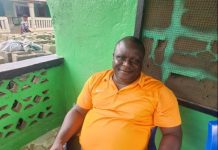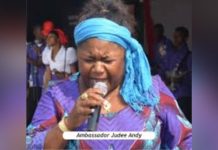Africa-Press – Liberia. An engaging and constructive dialogue unfolded in Montserrado County’s Electoral District #9 on Wednesday, November 12, as the Netherlands Institute for Multiparty Democracy (NIMD) and partners convened a Legislative Constituency Engagement between citizens and their lawmaker, Representative Frank Saah Foko.
The forum, co-funded by the European Union, Irish Aid, and the Embassy of Sweden under the Liberia Electoral Support Project Plus (LESP+), aimed to bridge the gap between lawmakers and their constituents through inclusive, policy-driven conversations.
The event, held at the Don Bosco Youth Center in New Matadi, brought together young people and community leaders, civil society actors, development partners, and the media—underscoring a shared commitment to deepening democratic participation and accountability.
Opening the session, Barwudu Johnson Williams of NIMD highlighted that the engagement aligns with Outcome 2 of NIMD’s programmatic priorities—strengthening legislative oversight and political accountability.
“This initiative is designed to promote constructive dialogue between lawmakers and citizens, ensuring that issues affecting young people, women, and marginalized groups are reflected in the national budget,” Williams explained. “We are deeply grateful to the EU, Irish Aid, the Embassy of Sweden, and UNDP for supporting this democratic space.”
Oscar Bloh, NIMD’s Country Director, outlined the objectives of the engagement, emphasizing transparency, inclusion, and citizen participation.
“We want to create a platform where lawmakers and their constituents can discuss development priorities and monitor legislative commitments through systematic oversight by civil society and the media,” Bloh said.
“Our hope is that this will set the pace for regular, structured dialogues that not only build trust but empower citizens to directly influence legislative outcomes.”
Bloh added that similar engagements are planned for other counties, including Grand Cape Mount, Bong, Margibi, and Nimba, as part of a broader effort to strengthen participatory governance nationwide.
Representative Foko Faces Constituents’ Concerns
When Representative Frank Saah Foko took the floor, he faced a mix of appreciation and frustration from his constituents. While acknowledging progress in some areas, many citizens questioned the slow pace of infrastructure development, limited job opportunities, and insufficient access to social services in District #9.
Responding, Foko outlined his advocacy priorities in the ongoing national budget discussions.
“We’ve focused on addressing community concerns—improving roads, ensuring that LEC prioritizes electricity connections, and that Water and Sewer provide access to clean water,” he said.
“I’m also pushing for increased allocations to JFK Hospital and LOIC to strengthen healthcare and vocational education for young people and women, including those with disabilities.”
Foko further disclosed plans to advocate for greater funding to the National Disaster Management Agency to respond to fire and flood incidents in the district.
Youth Demand Greater Empowerment
Representatives of the young people, who make up roughly 70% of District #9’s population—with an average age of about 19—were vocal about the need for tangible empowerment programs.
One of the youth leaders lamented the lack of opportunities for skills training.
“We want real investment in technical and vocational education,” she said. “Many of us are willing to work, but without training centers, we remain idle. The government must prioritize institutions like LOIC and MVTC.”
Another youth representative emphasized that empowerment goes beyond rhetoric.
“We don’t just need to be told we are the future—we need the tools now,” he stressed. “That means funding for agriculture, construction, and business development programs for young people.”
According to data from the Ministry of Youth and Sports, Liberia operates several Technical and Vocational Education and Training (TVET) centers, including the Monrovia Vocational Training Center (MVTC), Business Domestic Occupational Training Center (BDOTC), Klay Agriculture & Vocational Training Center (KAVTC), and the Youth Agriculture Training Center (YATC). These institutions provide training in agriculture, construction, tailoring, metalwork, and hospitality management—yet limited capacity and funding have left many young Liberians without access.
Participants urged the Ministry, in collaboration with lawmakers, to expand these programs and decentralize skills development opportunities.
Democracy in Action
NIMD’s Bloh lauded the openness of the dialogue, describing it as a model of participatory democracy.
“When citizens and lawmakers engage openly, it strengthens trust, accountability, and peace,” he noted. “Democracy works best when citizens are informed and empowered to participate.”
As the engagement concluded, NIMD and UNDP reaffirmed their commitment to continue supporting platforms that amplify citizen voices in governance.
For Representative Foko, the session served both as a report card and a call to action.
“We must ensure that our national budget reflects the priorities of our people—especially the youth who form the backbone of our country,” he pledged.
The Montserrado District #9 Legislative Engagement stands as a reminder that democracy thrives when leaders listen, and citizens speak. For Liberia’s young population—energetic, ambitious, and restless—the message was clear: inclusion must be matched by opportunity.
For More News And Analysis About Liberia Follow Africa-Press

